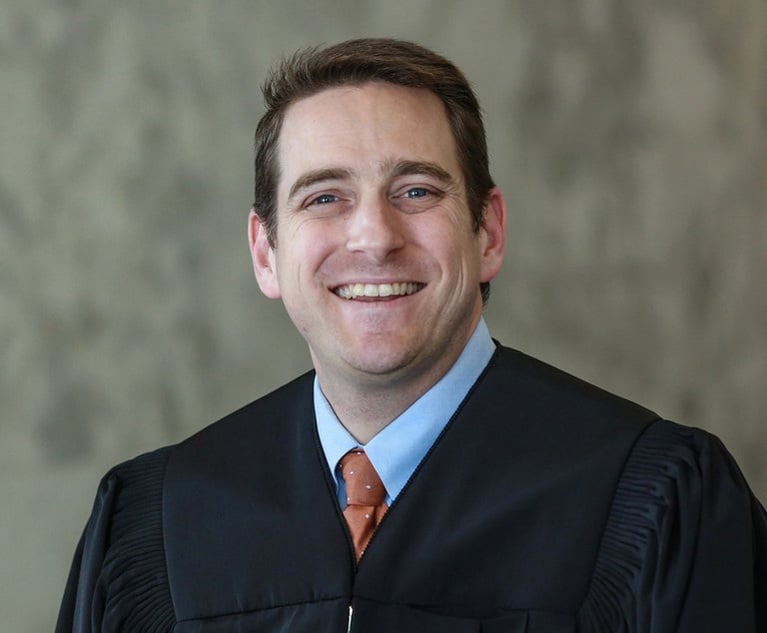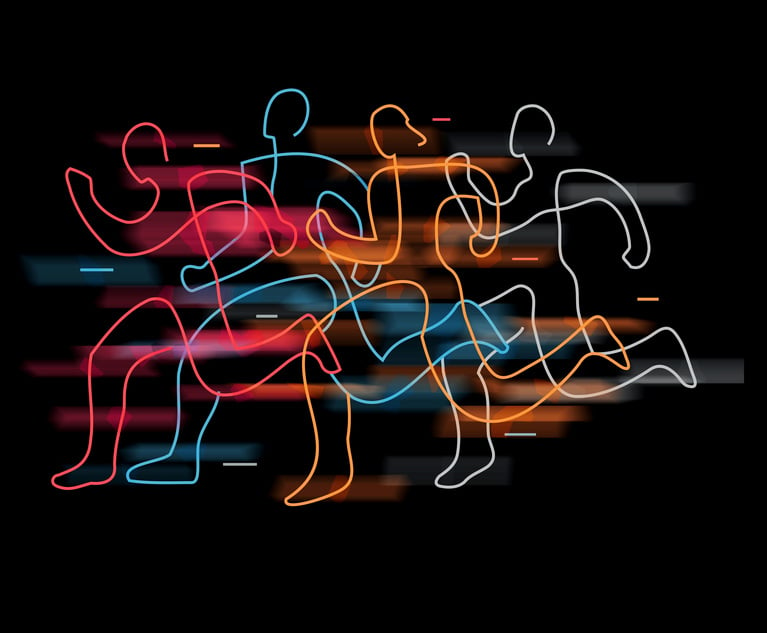With Patent Jury Trials Set Resume Next Month, Judges Get Creative
Plexiglass, larger deliberation rooms and physically distant seating are some of the safety solutions coming online in the heavy patent dockets of Texas and California. In New York, a judge is mulling a hybrid virtual/in-person bench trial.
May 21, 2020 at 05:26 PM
10 minute read
The original version of this story was published on Texas Lawyer
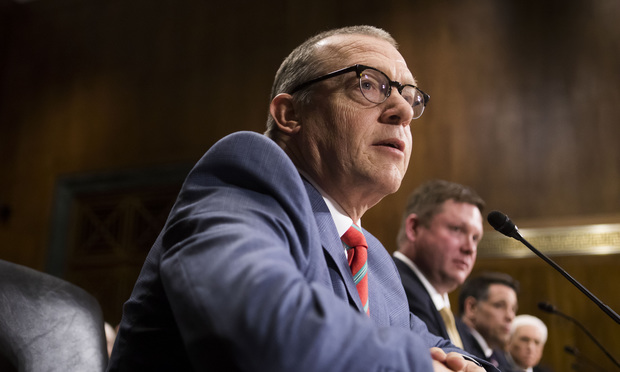 Alan Albright testifies before the Senate Judiciary Committee during his confirmation hearing in 2018. (Photo: Diego M. Radzinschi/ALM)
Alan Albright testifies before the Senate Judiciary Committee during his confirmation hearing in 2018. (Photo: Diego M. Radzinschi/ALM)Patent trials are ramping back up as federal courts take the first steps toward fully reopening their doors.
Jury trials are scheduled to get under way during the next six weeks in at least the Eastern and Western districts of Texas and the Northern District of California. And a bench trial that's part in-person, part virtual is under consideration in the Southern District of New York.
Judges are getting creative about ways to make participants, especially jurors, feel safe. U.S. District Judge Beth Labson Freeman of the Northern District of California, who has set a June 22 trial date for Finjan v. Cisco Systems, plans to utilize the San Jose courthouse's large ceremonial courtroom. She's using tape to indicate where participants can safely stand and sit. And she'll send jurors to an empty courtroom during breaks and deliberations, where they can maintain more space than in a traditional jury room.
"Judge Freeman has clearly put a lot of thought into it," said Fish & Richardson partner Juanita Brooks, who is part of Finjan's trial team.
Western District of Texas Judge Alan Albright said he's blessed with a large courtroom and jury box in his courtroom in Waco, Texas, where trial in MV3 Partners v. Roku is scheduled to begin June 29. Because the jury room is small, deliberations will instead be held in the basketball-court-sized jury assembly room, "so they would be able to self-space however they want to," Albright said.
Albright said he and Freeman recently spent an hour on the phone brainstorming ideas, and he fully intends to debrief with U.S. District Chief Judge Rodney Gilstrap of the Eastern District of Texas, who is scheduled to start a patent trial earlier in June.
"I think at some point we do need to get back to trials," said Albright, who noted that patents are a depreciating asset. "The only way for each region of the country to know that it's ready is to do it."
Not every region is ready. The Southern District of New York has suspended jury trials indefinitely. Gov. Andrew Cuomo has extended the state's stay-at-home order to June 13, and SDNY's standing order on operations notes that at least four weeks will likely be required to assemble a jury venire panel.
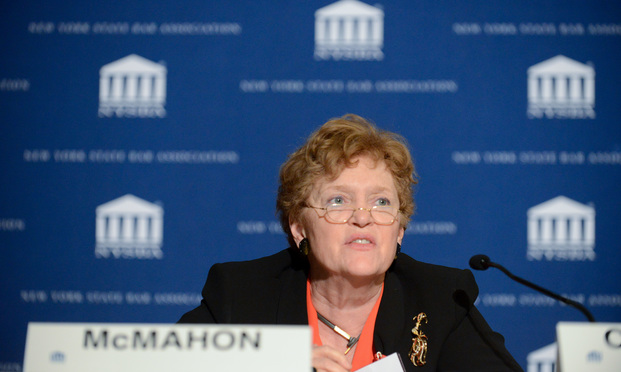 U.S. District Chief Judge Colleen McMahon of the Southern District of New York. (Photo by David Handschuh/NYLJ)
U.S. District Chief Judge Colleen McMahon of the Southern District of New York. (Photo by David Handschuh/NYLJ)Still, SDNY Chief Judge Colleen McMahon is pressing ahead with a bench trial in the patent infringement case Ferring Pharmaceuticals v. Serenity Pharmaceuticals that's set to start July 6. In a telephonic hearing Wednesday, she explored the idea of a hybrid trial, part held in court, and part virtually. "I'm willing to hear from people remotely. If people want to take advantage of that, feel free," McMahon said. "If witnesses want to be in the courtroom, they will be testifying behind a plexiglass shield. They will be protected. We will have all manner of remote seating, and cleaning agents, and new protocols and procedures." She expects at least one lawyer from each side to be present in court.
Skiermont Derby's Paul Skiermont, who represents Serenity Pharmaceuticals LLC, said that after talking with a technology provider, he believes that once you start down the remote route, it's best to go 100% remote.
But Womble Bond Dickinson partner Mary Bourke, who represents Ferring Pharmaceuticals Inc., said she'd spoken with a trial coordinator and a graphics "hot seat" person who are willing to come to the courtroom. "The preference for us would be in the courtroom with the trial coordinator, with the trial graphics, such that when these glitches occur … we have the technical support there to assist us," she said.
It wouldn't be the country's first virtual patent trial. U.S. District Judge Henry Coke Morgan is currently presiding over a virtual bench trial by Zoom in an Eastern District of Virginia patent case. And U.S. District Judge Yvonne Gonzalez Rogers of the Northern District of California just conducted a virtual Markman claim construction hearing by Zoom on May 15.
"Overall, it was a real positive experience," said Pillsbury Winthrop Shaw Pittman partner David Jakopin, who represented SiTime Corp. in the Markman hearing. "It'll be interesting to see how other Markmans later evolve. I think we're in this for awhile."
It appears safe to say that each judge and each district court are going to operate at their own pace. "The judges take personal pride in the management and running of their courts," said Dechert partner Katherine Helm, a former law clerk for the Northern District of California. Some are proceeding extra cautiously, while others seem eager to develop best practices.
In Waco, MV3 v. Roku had been scheduled for trial June 1, but Albright continued it to June 29 after the Western District of Texas postponed all trials through the end of May. MV3 alleges that it invented a novel set top box that enables the provisioning of both broadcast and internet content for display on a large television screen. MV3 is represented by Kasowitz Benson Torres; Mandel, Tindel & Thompson; and Haley & Olson. Roku is represented by Oblon, McClelland, Maier & Neustadt and three other firms.
Albright said the court has arranged for extra cleaning of the courtroom and the jury assembly room and has consulted with Waco's mayor and other other officials with the aim of ensuring that participants don't interact any more closely with each other than they would if shopping for groceries or attending church services under current guidelines. The court will limit prospective jurors to four per gallery bench, which will allow for 48 to be questioned while maintaining physical distance.
Attorneys will be required to maintain distance at counsel's table too. Albright intends to limit each side to two lawyers, plus possibly one corporate representative. He's scheduled 15 hours aside for the one-patent trial, a couple of hours more than he would normally allot, because he knows there are bound to be unexpected issues. While he hates to sacrifice efficiency, "making sure we get it right" is paramount, Albright said.
All of that work could end up being for naught. The Patent Trial and Appeal Board launched an administrative review of MV3′s patent last July. The board found a reasonable likelihood that 55 of 61 challenged claims are obvious in light of a similar 2007 patent. The board has scheduled oral arguments for May 26 and has said it intends to issue a final written decision by July 16.
In San Jose, Finjan Inc. is suing Cisco Systems Inc. over five anti-malware patents after a 20-year partnership between the companies went sour. Beginning in the late 1990s Cisco incorporated Finjan's technology and invested in the company, at one point holding a 7.5% stake and a non-voting seat on Finjan's board. But the parties fell out in 2013 once Finjan began focusing more on patent assertion and Cisco acquired Sourcefire and incorporated Sourcefire's technology into its security products.
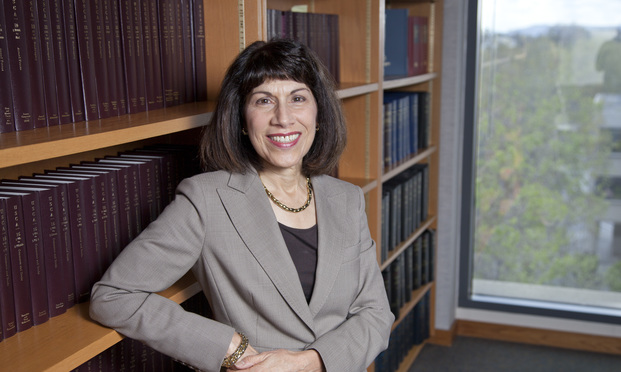 U.S. District Judge Beth Labson Freeman, Northern District of California. (Photo by S. Todd Rogers/The Recorder)
U.S. District Judge Beth Labson Freeman, Northern District of California. (Photo by S. Todd Rogers/The Recorder)Finjan has licensed its technology to numerous other companies, including FireEye for $12 million, Trend Micro for $13.4 million, Sophos for $17.5 million and Symantec for at least $65 million. Cisco tried but failed to get two patents reviewed at the Patent Trial and Appeal Board. Finjan says it's now raising "second-string" prior art before Freeman and has asked her to grant summary judgment of validity for Finjan. Freeman declined.
Instead the parties will go to trial June 22. Unlike Albright, who believes he can seat 48 venire members safely in his large courtroom, Freeman will bring her 50-member venire into court in groups of 10 for questioning.
But will enough prospective jurors be willing to show up to get a reasonable cross-section of the community? Brooks, the Fish & Richardson lawyer who represents Finjan, admits that only time will tell, but she's optimistic. Prospective jurors who've been stuck at home the last few months might say, "This could be a way I could spend three weeks out of the house and maintain social distance," she says.
Meanwhile, Morgan continues to hear evidence in the virtual bench trial of Centripetal Networks v. Cisco Systems in the Eastern District of Virginia. Cadwalader, Wickersham & Taft partner John Moehringer, who's been listening in to the public audio feed, said the trial generally seems to be going smoothly, although at a slow and measured pace.
Moehringer also observed the Zoom technical tutorial and Markman hearing in VTT Technical Research Centre of Finland v. SiTime. "The Zoom technology was impressive and the presentations seemed to go smoothly," Moehriner said. He said the slides presented to the court seemed more static than usual. "They were good, but I believe if the hearing was in person, they would have had someone in the hot seat creating highlighting on the fly," Moehringer said.
Jakopin, the Pillsbury lawyer who represents SiTime, agreed that would have added another dimension of difficulty. In any event, the parties geared their presentation to Gonzalez Rogers' preference for an interactive exchange with the lawyers, which means less emphasis on slides.
One plus of the virtual format is that clients didn't have to travel to court and go through courthouse security in order to participate, Jakopin said. On the down side, it's harder to read the room, including opposing counsel and the judge, during the hearing. "There are advantages, but there are personal aspects that get lost," he said.
Meanwhile, the Ferring bench trial is set to begin in early July. Ferring and Serenity are contesting the patent rights to drugs that help reduce nighttime trips to the bathroom.
"I need to get this case tried, and I am not prepared to wait until the world is back to normal to get it done," McMahon wrote in an April 23 order. "Bench trials are the one type of proceeding that can go forward, even during a pandemic."
How much that bench trial will be in court and how much will be done virtually remains to be seen. McMahon told the parties at Wednesday's hearing she expects to have a plan in place soon. "I think I'm going to end up spending a lot of the holiday weekend thinking about this," she said.
This content has been archived. It is available through our partners, LexisNexis® and Bloomberg Law.
To view this content, please continue to their sites.
Not a Lexis Subscriber?
Subscribe Now
Not a Bloomberg Law Subscriber?
Subscribe Now
NOT FOR REPRINT
© 2025 ALM Global, LLC, All Rights Reserved. Request academic re-use from www.copyright.com. All other uses, submit a request to [email protected]. For more information visit Asset & Logo Licensing.
You Might Like
View All
How the Court of Public Opinion Should Factor Into Litigation Strategy
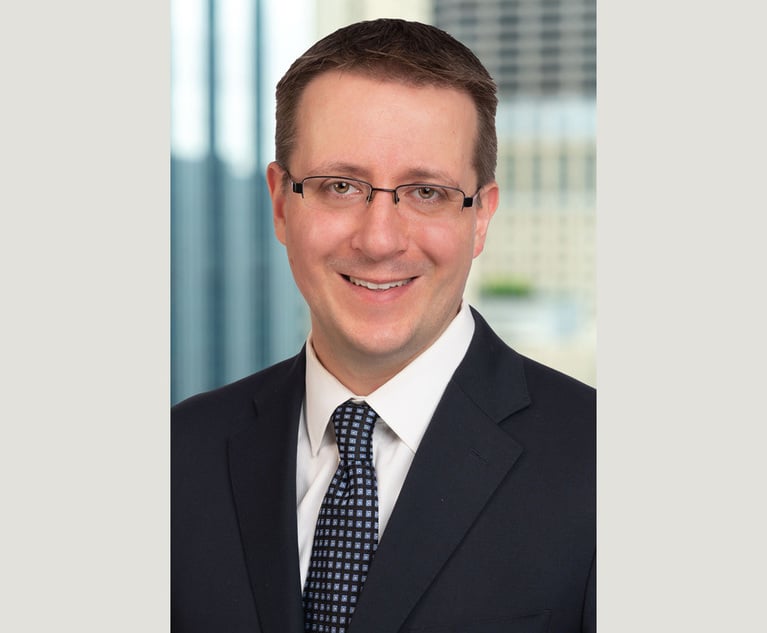
An Eye on ‘De-Risking’: Chewing on Hot Topics in Litigation Funding With Jeffery Lula of GLS Capital
Trending Stories
Who Got The Work
J. Brugh Lower of Gibbons has entered an appearance for industrial equipment supplier Devco Corporation in a pending trademark infringement lawsuit. The suit, accusing the defendant of selling knock-off Graco products, was filed Dec. 18 in New Jersey District Court by Rivkin Radler on behalf of Graco Inc. and Graco Minnesota. The case, assigned to U.S. District Judge Zahid N. Quraishi, is 3:24-cv-11294, Graco Inc. et al v. Devco Corporation.
Who Got The Work
Rebecca Maller-Stein and Kent A. Yalowitz of Arnold & Porter Kaye Scholer have entered their appearances for Hanaco Venture Capital and its executives, Lior Prosor and David Frankel, in a pending securities lawsuit. The action, filed on Dec. 24 in New York Southern District Court by Zell, Aron & Co. on behalf of Goldeneye Advisors, accuses the defendants of negligently and fraudulently managing the plaintiff's $1 million investment. The case, assigned to U.S. District Judge Vernon S. Broderick, is 1:24-cv-09918, Goldeneye Advisors, LLC v. Hanaco Venture Capital, Ltd. et al.
Who Got The Work
Attorneys from A&O Shearman has stepped in as defense counsel for Toronto-Dominion Bank and other defendants in a pending securities class action. The suit, filed Dec. 11 in New York Southern District Court by Bleichmar Fonti & Auld, accuses the defendants of concealing the bank's 'pervasive' deficiencies in regards to its compliance with the Bank Secrecy Act and the quality of its anti-money laundering controls. The case, assigned to U.S. District Judge Arun Subramanian, is 1:24-cv-09445, Gonzalez v. The Toronto-Dominion Bank et al.
Who Got The Work
Crown Castle International, a Pennsylvania company providing shared communications infrastructure, has turned to Luke D. Wolf of Gordon Rees Scully Mansukhani to fend off a pending breach-of-contract lawsuit. The court action, filed Nov. 25 in Michigan Eastern District Court by Hooper Hathaway PC on behalf of The Town Residences LLC, accuses Crown Castle of failing to transfer approximately $30,000 in utility payments from T-Mobile in breach of a roof-top lease and assignment agreement. The case, assigned to U.S. District Judge Susan K. Declercq, is 2:24-cv-13131, The Town Residences LLC v. T-Mobile US, Inc. et al.
Who Got The Work
Wilfred P. Coronato and Daniel M. Schwartz of McCarter & English have stepped in as defense counsel to Electrolux Home Products Inc. in a pending product liability lawsuit. The court action, filed Nov. 26 in New York Eastern District Court by Poulos Lopiccolo PC and Nagel Rice LLP on behalf of David Stern, alleges that the defendant's refrigerators’ drawers and shelving repeatedly break and fall apart within months after purchase. The case, assigned to U.S. District Judge Joan M. Azrack, is 2:24-cv-08204, Stern v. Electrolux Home Products, Inc.
Featured Firms
Law Offices of Gary Martin Hays & Associates, P.C.
(470) 294-1674
Law Offices of Mark E. Salomone
(857) 444-6468
Smith & Hassler
(713) 739-1250





